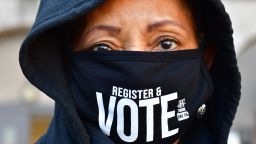Editor’s Note: Julian Zelizer, a CNN political analyst, is a professor of history and public affairs at Princeton University and author of the forthcoming book “The Presidency of Donald J. Trump: A First Historical Assessment.” Follow him on Twitter @julianzelizer. The views expressed in this commentary are his own. View more opinion on CNN.
That Donald Trump acknowledged some responsibility for the January 6, 2021, insurrection, according to House Minority Leader Kevin McCarthy, pulls back the curtain on a former president who has publicly downplayed the actions of his supporters at the US Capitol that day and shown little remorse for pushing the lie that the 2020 election was “stolen.”
And to get insight into the way Republican leaders like McCarthy and then-Senate Majority Leader Mitch McConnell were privately angry with Trump in the immediate aftermath of the insurrection – only to publicly gloss over the incident in the following weeks – shows just how dire the state of politics is today.
According to audio recordings obtained by two New York Times reporters, McCarthy told House Republicans on January 11, 2021, “I asked him personally today, does he hold responsibility for what happened? Does he feel bad about what happened? He told me he does have some responsibility for what happened. And he needs to acknowledge that.”
In the days after the insurrection, McCarthy privately slammed Trump’s conduct on January 6, calling it “atrocious and totally wrong,” according to the New York Times. In another call with fellow Republicans, he went so far as to say, “I’ve had it with this guy.” He also told Rep. Liz Cheney of Wyoming he would advise the former president to resign, a move his spokesperson denied on Thursday evening before the New York Times released audio recordings of his statements.
Similarly, McConnell predicted Republicans would break from Trump and asked a reporter in the Capitol about the possibility of the cabinet invoking the 25th Amendment. And over lunch with two advisers, McConnell turned to the possibility of impeachment, saying, “The Democrats are going to take care of the son of a bitch for us.” There was even speculation among Republican colleagues McConnell would vote to convict Trump. “If this isn’t impeachable, I don’t know what is,” McConnell had said, according to the New York Times report.
Both McCarthy and McConnell, of course, voted to acquit Trump of inciting an insurrection when the former President was impeached for the second time.
Despite their initial responses, both Republican leaders ended up backing away from the issue, fearing the political repercussions of taking on Trump. As Rep. Bill Johnson of Ohio put it in January 2021 during a call with other Republican lawmakers, conservative voters would “go ballistic” if they criticized Trump. He advised members of the party to redirect their ire at Democratic bogeymen like Hunter Biden and Hillary Clinton instead.
McCarthy went on to visit the former President at Mar-a-Lago in late January 2021, and McConnell, unwilling to stick his neck out, told a friend, “I didn’t get to be a leader by voting with five people in the conference.” By late February 2021, when asked on Fox News whether he would support Trump as the Republican presidential nominee in 2024, McConnell replied, “Absolutely.”
This refusal to hold Trump accountable, and the pressure both McCarthy and McConnell felt to take this stance, reveals just how far most of the Republican Party has shifted in recent decades. Even something as dramatic as a full-scale attack on a presidential election, coupled with a violent attack on Congress, is not enough to break the rank partisanship we’ve seen from Republicans. It’s clear from their actions that maintaining political power supersedes all else, even the health of our democratic institutions.
McCarthy and McConnell aren’t the only ones to blame. Most Republicans continue to stand by the former President after downplaying the significance of January 6. Rep. Andrew Clyde of Georgia tried to gaslight the country by casting the violent mob violence as a “normal tourist visit.” And there was little pushback when Rep. Matt Gaetz of Florida falsely claimed members of Antifa were to blame, citing an article from the Washington Times later removed from its website and saying he didn’t “know if the reports (were) true.”
In fact, the Republican Party has made investigations into January 6 extraordinarily difficult, placing the burden on Democrats, rather than working in bipartisan fashion. The few Republicans who have joined Democrats on this issue, such as Cheney, who was recently awarded the John F. Kennedy Profile in Courage Award, have been punished by their party.
The new heroes of the party have included extremists like Rep. Marjorie Taylor Greene of Georgia, who is currently the focus of a legal hearing in Atlanta which could disqualify her from running for reelection. The case centers on a provision in the Fourteenth Amendment prohibiting officials who take an oath to uphold the Constitution from holding future office if they “engaged in insurrection or rebellion against the same, or given aid or comfort to the enemies thereof.” (Green denies allegations she encouraged the violence on January 6)
The suit was launched by several of her constituents, with the backing of constitutional scholars and liberal activists, and Greene was publicly questioned under oath about her role in the attack on Friday. Although the odds of success in this case are slim, it could provide insight into the potential connections between elected officials and the mob at the Capitol. It will also give Republicans in Washington yet another chance to take a more forceful stand against the “big lie,” although it’s safe to say no one will be holding their breaths at this point.
How politicians deal with January 6 should be a litmus test for voters to think about the fundamental values of each political party. The attack against Congress, and our election system, was not simply another event – it was a defining moment for our democracy.
It is notable the Kennedy Foundation is giving its “profile in courage” award to Cheney, along with Ukrainian President Volodymyr Zelensky, who is in the midst of defending his nation from a brutal military assault against an autocratic Russian regime. As much as the award acknowledges the courage Cheney has shown, it is also a reminder of how far the GOP has fallen when it comes to partisanship. This was the mindset that drove McCarthy and McConnell to continue backing Trump after a few days of private outrage. And it is the mindset that speaks much more loudly than any private ruminations we can now hear on tape.



